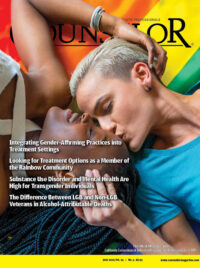As a psychologist specializing in working with women and trauma, as a cofounder of the National Association of Children of Alcoholics, and as an author of books on self-parenting, parenting, and women, I have struggled with why so many women seem stuck in their recovery. Yes, we have figured out how to help women see that they may be following traditions of certain types of connection within their alcoholic families. We have helped them identify and address their trauma. We have developed specialized treatment services for women, but there has been a glaring, missing piece. We haven’t helped them to understand themselves as women!
One reason I wrote The Girly Thoughts 10-Day Detox Plan was to provide women a name for this toxic inner dialogue that is so common to all of us. I wanted to give women a way to wrap our minds around what is really going on, and give us ways to deal with it other than trying to anesthetize the pain this voice engenders.
Federal Recommendations
We know treatment need to be gender specific, but so far we have been very limited in our interpretation. The Substance Abuse and Mental Health Services Administration’s (SAMHSA’s) TIP 51 states that “substance abuse treatment for women [should] be approached from a perspective that encompasses the contexts of women’s lives: a woman’s social and economic environment; her relationships with family, extended family, and support systems; and the impact of gender and culture” (2014). In discussing patterns of use, SAMHSA indicates that “Women often report that stress, negative affect, and relationships precipitate initial substance use” (2014).
Our efforts to date have been limited to an important focus on trauma, family of origin, and mental health concerns—all significant, but the elephant in the room has been ignored, and that is the impact of culture on just being a woman. Until now, our treatment efforts have not been extended to helping women understand how they see themselves as women. We haven’t encouraged truth-telling here, and I believe that an important contributing factor is because we haven’t—until now—had a term to use.
Focusing on Culture’s Impact
We need to expand our focus in working with women and in training our counselors in developing an understanding of “gender and culture . . . (and) relationships” (SAMHSA, 2014) by making conscious the role of “girly thoughts”—those toxic, societally driven messages that women internalize. Girly thoughts cause women to first blame themselves for everything that goes wrong in their lives because they just don’t measure up . . . and then to anesthetize themselves to avoid feeling bad about themselves for being “so inadequate.”
I’m not speaking about low self-esteem (which is the result of this type of thinking); I’m speaking about tackling a major source of low self-esteem for many women who are addicted, depressed, and traumatized. I’m suggesting we expand our focus to girly thoughts.
The Missing Piece
Yes, as surprising as this sounds, we haven’t focused on helping women understand themselves in our media-saturated culture. Digitally altered images of desirability and acceptability leave those of us who do not have a team of trainers, stylists, chefs, and wardrobe consultants feeling less than. But then again, many of the celebs we see as role models also suffer from the same gnawing anxiety that some imperfection—some large pore, pimple or weight gain, perhaps only noticeable to them—will cause them to be rejected.
So is it any wonder that women who feel stressed by their girly thoughts and begin to deal with this by going out to have a drink—or four—with friends to de-stress after work before facing their husband or boyfriend at home could begin on what is for some is a very slippery slope of medicating their stress?
The Power in Naming Something
There is great importance in having a name for something. As professionals in this field we know this better than most. Once we developed and popularized the term “alcoholism,” affected individuals and their families had a name for what was going on, which helped them realize that, no, they weren’t crazy, they had a brain disease, and as a result, there was treatment.
The same holds true for so many things that afflict humans. From labeling posttraumatic stress disorder (PTSD) to redefining Asperger’s syndrome as a form of autism to creating a term for the phenomenon of global warming, naming something gives us power over it. When you can wrap your mind around something, you can address it, you can look at it. You gain some control over it.
This is especially true for having a name for the way our culture negatively affects women—and “girly thoughts” is the name I have developed. It’s a label that is purposefully a little annoying, just like girly thoughts are, and it’s easy to remember because it addresses what women are doing when they reason the way they did when they were young girls to address what makes them feel uncomfortable and insecure.
Girly Thoughts Reasoning
Girly thoughts lead women to make assumptions—If this, then that—that are harmful to them and to their treatment and recovery.
Girly thoughts reasoning goes something like this:
- I have to hang out in a bar, or he’ll find someone else who will.
- My breasts are too small, and that’s why he’s had an affair.
- I can’t say what I think because no one will like me.
- I’m too old to be choosy in relationships.
- I’m fat, so I’m unattractive.
Combatting Girly Thoughts using The Girly Thoughts 10 Day Detox Plan
As we know, the pain some women feel because of their girly thoughts can be overwhelming. Feelings of not looking good enough, or embracing the belief that they’re acting in a way that is too strong or too pushy, can lead some women to anesthetize those feelings by drinking, drugging, eating, gambling . . . in short, doing anything that will take them away from their discomfort and will give them momentary pleasure. But as we know, this type of behavior may quickly move beyond occasional use for some women. The Girly Thoughts 10 Day Detox Plan helps women address these feelings by letting them know that:
- You are not crazy—it’s just your girly thoughts talking. Many women know that what they are thinking does not make any real sense, and they begin to think they are a little nuts. Having a name for girly thoughts normalizes the experience of thinking these self-sabotaging thoughts, as upsetting as they are, and gives women a way to objectify these thoughts, which helps them see their girly thoughts as not who they are, but just what they are thinking.
- You are not alone. Women can stop feeling so isolated. Having a name for this toxic inner dialogue gives them a way to communicate with others about what is going on within them.
- You can have power over this—because you can name it. Having power over your thinking is the first step toward changing your thinking.
Want to have some fun? Here are ways to use the book to incorporate this power label into your treatment sessions with women:
- Introduce the concept of girly thoughts to the women in your treatment program.
- Encourage them to identify their girly thoughts.
- Encourage them to identify the girly thoughts of other women in their program.
- Work with them to identify girly thoughts in ads in magazines, online, in TV shows, and in popular movies.
- Discuss the pressure girly thoughts have placed on them, and specifically how that pressure has encouraged them to check out through food, drugs, drinking, and other addictions.
- Ask them how they feel about their own girly thoughts.
- Discuss ways they can replace their girly thoughts with more empowering messages.
- Encourage them to have fun playing with what they would like to do to those who perpetuate their girly thoughts.
Don’t Forget Yourself
Begin to identify your own girly thoughts so you can not only be more comfortable using this new term with your clients, but also so that you can begin to experience the dramatic shift within yourself that this new term creates. Just think of how much easier your life will be if you stop wasting energy on your own inner trash talk.
Another Tool
Think of using the concept of girly thoughts as another tool in your toolbox for the important work of helping women recover. This is a way of augmenting your program to fully address all the needs of the women who enter, including the most basic one: that of being a woman.
References
Substance Abuse and Mental Health Services Administration (SAMHSA). (2014). Substance abuse treatment: Addressing the specific needs of women. A treatment improvement protocol TIP 51. Retrieved from http://store.samhsa.gov/shin/content//SMA14-4426/SMA14-4426.pdf
Buy Now >> Use coupon code WWRBOOKS at checkout for an additional 20% off!












 Counselor Magazine is the official publication of the California Association of Addiction Programs and Professionals (CCAPP). Counselor offers online continuing education, article archives, subscription deals, and article submission guidelines. It has been serving the addiction field for more than thirty years.
Counselor Magazine is the official publication of the California Association of Addiction Programs and Professionals (CCAPP). Counselor offers online continuing education, article archives, subscription deals, and article submission guidelines. It has been serving the addiction field for more than thirty years.